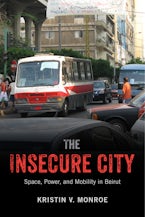"Provides the researcher on Lebanon a solid grasp on the way mobility and class intersect. One of the book's strengths is that it is written in an approachable style, making it highly suitable to assign in an undergraduate classroom when dealing with topics of mobility and security. That the book comes at a time of increasing insecurity and securitization in the region makes it even more timely for an audience beyond Lebanon."
(Anthropological Quarterly) "This book offers a telling glimpse into a moment of Lebanese history whose inherent contradictions make one think about the ways in which not only “mobilities” but also contemporary surveillance technologies and practices are informed by the longue durÉe of local sectarian formations."
(Journal of Anthropological Research) "A welcome contribution to ethnographies of Beirut as well as to critical studies of security and precarity in 21st-century cities."
(American Ethnologist) "Kristin Monroe has written a remarkable book about the violence of everyday life in Beirut and has developed a fresh approach to understanding the difficulties of living in this 'wounded' city."
- Setha Low (Graduate Center of the City University of New York) "Monroe smoothly leads the reader on a journey into Beirut’s streets, with its chaotic traffic, checkpoints, and busy street life. She makes a significant contribution to emerging social science studies about Beirut."
- Aseel Sawalha (Fordham University) "Monroe smoothly leads the reader on a journey into Beirut’s streets, with its chaotic traffic, checkpoints, and busy street life. She makes a significant contribution to emerging social science studies about Beirut."
- Aseel Sawalha (Fordham University) "Kristin Monroe has written a remarkable book about the violence of everyday life in Beirut and has developed a fresh approach to understanding the difficulties of living in this 'wounded' city."
- Setha Low (Graduate Center of the City University of New York) "A welcome contribution to ethnographies of Beirut as well as to critical studies of security and precarity in 21st-century cities."
(American Ethnologist) "This book offers a telling glimpse into a moment of Lebanese history whose inherent contradictions make one think about the ways in which not only “mobilities” but also contemporary surveillance technologies and practices are informed by the longue durÉe of local sectarian formations."
(Journal of Anthropological Research) "Provides the researcher on Lebanon a solid grasp on the way mobility and class intersect. One of the book's strengths is that it is written in an approachable style, making it highly suitable to assign in an undergraduate classroom when dealing with topics of mobility and security. That the book comes at a time of increasing insecurity and securitization in the region makes it even more timely for an audience beyond Lebanon."
(Anthropological Quarterly)

